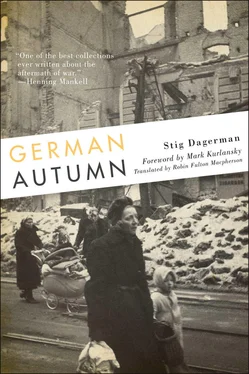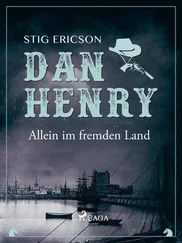‘No longer suitable for goods. Only for people.’
And more bitterly: ‘Just think, fellow-countrymen evicting fellow-countrymen. Germans against Germans. The worst of all.’
The very fact that it is Germans who are responsible for having dispatched this train seems to cause him more distress than the condition of the train and its occupants. The young doctor is a Conservative anti-fascist who at a pinch can regard even Nazism from the point of view of national necessity. When he talks about the occupation of Norway, where he was sent as an army doctor just after passing his exams, he tells me about wonderful ski trips in the moonlight on the Norwegian mountains near where he was stationed. Hearing him speak like this one would think the Germans occupied Norway for the sake of winter sports. And yet it is hard to avoid feeling that Dr W. is in his way a decent person.
Now at any rate he is sufficiently well bred and sufficiently honest to accept and even co-operate loyally with the Allied authorities in the cleaning up of Essen. But for him, as for many other young people from the better-off classes who were nourished not on Nazism but on an idealistic nationalism which involves a respectable kind of ruthlessness in victory and loyal dignity in defeat, the experience of German ruthlessness towards Germans comes as a terrible shock.
It is possible that in this respect the country is now finding itself in a situation unique for Germany: the conflicts between the large interest-groups within the population are so acute that to a certain extent they deprive the reactionary powers which exist in the people’s consciousness of an operational base from which they can conduct effective neo-nationalist propaganda. The passengers on this train hate Bavarian farmers and Bavarians in general, and the relatively prosperous Bavaria looks with mild contempt on the hysteria rampant in the rest of Germany. City people accuse country people of letting food land up on the black market, while country people in turn maintain that city people rove about the countryside like plunderers. The refugees from the east speak bitterly about the Russians and the Poles, but are themselves regarded as intruders and end up living in a state of war with the people of the west. The oppressive atmosphere in the west is criss-crossed by rancorous feelings which are as yet not explicit enough to cause more than isolated explosions of violence.
A good many of the people on the train have been into town and found their old apartments taken over by strangers. Now they are sitting in the straw nursing their bitterness, but on the platform two old ladies are arguing about how Hitler really can be alive, as the rumours in the Western Zone have it.
‘Der Schweinehund,’ says the elder and more ragged of the two and makes a cutting gesture across her throat. ‘If only we had him here!’
In the meantime some members of the Swedish Red Cross have arrived with dried milk for those children on the train who are under four. We search through the train, followed by a begging crowd who are clearly older but who are still hoping for something. Someone opens a closed door on one of the wagons and a ragged white-haired patriarch appears from the darkness.
‘No, no children here,’ he stammers, ‘only my wife and myself. We’re nearly eighty. We live here. It’s our fate. So ist unser los.’
And in a dignified manner he closes the door. But in another wagon there is a girl in a wheelchair in a state of shock. The uniform seen in passing must have wakened some terrible memory in her, for she breaks out in a scream, a dreadful shrill cry that suddenly cracks and gives way to a dog-like whining. The rain is pouring down, and the barefoot boys are running about silently on the platform. The smoke from the stove-pipes protruding from the doors spreads its veil slowly out over the abandoned marshalling yard. All the hopelessness of the Ruhr is lying like a grey cloud of leaden wet coldness over our heads; anyone coming to this for the first time would find it hard not to scream. Someone lifts down the hysterical girl’s wheelchair and begins to wheel it found on the platform. Round and round in the rain and mud.
It is convenient but not necessarily helpful to regard Germany as a patient, Europe’s ‘sick man’, in desperate need of injections of anti-Nazi serum. There is no doubt that in one way or another Germany ought to be cleansed of Nazism, but what is doubtful in this connection is that the patient theory presupposes a mystical unity which simply does not exist in Germany today. It is just not the case that the German people are thus divided into two blocs: a small anti-Nazi victory monument of gravestone dimensions, and a huge Nazi memorial of vast proportions ready to tip over at the least puff of opposition and bury all the little barricades of freedom under its threatening weight of marble.
Anyone who has spent some time with Germans from different levels of society soon discovers that what appeared upon a brief acquaintance with current German thinking as an unbroken unity is in fact a mesh of diagonal, vertical and horizontal cracks. What was assumed to be unshakeable unity is only a superficial agreement on certain elementary opinions: all Germans think that the seven million POWs should come home and that those who come home should weigh more — quite physically — than those Germans who return from Russian arsenals and French mines. All Germans agree that the zone boundaries should be abolished and that the dismantling of industrial plant, if it is really necessary, should not mean for example that expensive machine-parts confiscated by the Russians are left to lie rusting away on barges in Hamburg’s docks. Further, all Germans in the Western Zone agree, albeit on the basis of differing premisses, that the huge consignments of refugees from the east to the west are a form of invisible pressure exerted by the Russians on the Allies; by pumping the Allied zones full of destitute people the Russians would be able to create quickly a situation of Verelendigung which at a given moment of maximum stress must give vent to an explosion of a kind devastating for the Western occupying powers.
Opinions with regard to the Allies are unanimous only in the sense that a certain feeling of restriction is common to all Germans. Still, it is felt even in strongly reactionary circles that there is no objective basis for any sort of resistance, including the passive sort. In reality the Germans regard themselves as occupied in a different way, for instance, from how the French regarded themselves as occupied: one finds no public contempt for the occupying power, hardly even for the occupier’s girl-friends, and the only kind of democratic education which the Allies have so far attempted — the efforts made by the Americans to turn German youngsters into good baseball players — has in its way met with a lively interest on the part of the youngsters.
It is not difficult then to identify common views cutting like highways through all the different social classes, just as here at home it is not difficult to identify the lack of divided opinions on modernist poetry or certain aspects of tax law. But what is important is that these shared views do not in any way contribute to the erosion of the bitter frontiers between the rival groups within the population. The hatred between the farmers and the city people has already been mentioned, and the even greater hatred between the poor city people evacuated to the country, whose distress is every bit as acute as that of the people left in the cities, and the farmers, who this autumn were still bartering food for clothes and linen but when inflation in the value of clothes and linen set in, even in the countryside, then wanted gold, silver and watches in return for potatoes, eggs and butter. The class divisions between the poor and the least poor have also been mentioned, the rising irritation between refugees and residents, and the reckless rivalry between competing political parties.
Читать дальше












